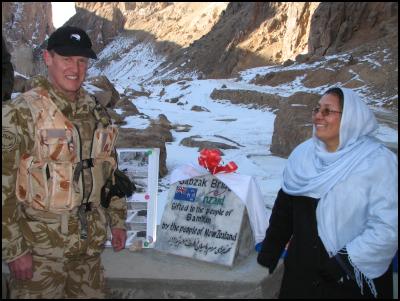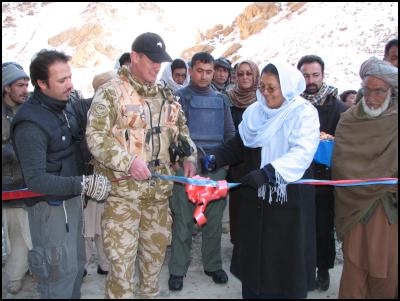Kiwi Troops Give Boost to Afghan Tourism
Kiwi Troops Give Boost to Afghan Tourism

Click to enlarge
Group Captain Kevin Short and Bamyan provincial governor Habibi Sarabi at the opening of one of the two bridges this week.

Click to enlarge
Group Captain Kevin Short cuts the ribbon to open one of the new bridges this week. Bamyan provincial governor Habibi Sarabi and a crowd of interested locals look on.
New Zealand Defence Force
Te Ope Kaatua O Aotearoa
Media Release
19 January, 2007
KIWI TROOPS GIVE BOOST TO AFGHAN TOURISM
New Zealand troops serving in Afghanistan’s Bamyan province gave a huge boost to tourism this week, opening two new bridges to improve access before the summer sightseeing season.
Located on the main roads into the province from Kabul and the Yakawalang district, the two bridges are part of a three bridge development project managed by the 108-strong New Zealand Provincial Reconstruction Team (NZ PRT).
Contingent commander Group Captain Kevin Short said the bridges would open up important access routes which would allow greater supply of goods and boost tourism.
“Good roads and bridges such as these will assist the Bamyan province to move towards its goal of becoming the tourist capital of Afghanistan.”
Bamyan province is home to the Bamyan Buddhas and the ancient city of Gholgola, historical and religious sites which are seen as two of the country’s biggest tourism assets.
Bamyan provincial governor Habibi Sarabi said projects such as these ensured the province continued to move forward and allowed local people to find employment and become more self-sufficient.
The NZ PRT facilitated the construction of the bridges with funding from NZAID and the US-based Commander Emergency Response Program.
Other projects undertaken by the NZ PRT since their arrival in September 2003 have included the construction of Bamyan Boys High School, five police stations, a maternity ward at Bamyan hospital and a number of other bridges.
The NZ PRT has also helped in the construction of new local government infrastructure, wells for local villagers and the purchase of new equipment for Bamyan’s medical services and police.
ENDS


 Gordon Campbell: On Budget 2025
Gordon Campbell: On Budget 2025 Colin Peacock, RNZ: Mediawatch - How A Budget Is Covered
Colin Peacock, RNZ: Mediawatch - How A Budget Is Covered SKYCITY Auckland: Firefighter Sky Tower Challenge Raises Over $1.9 Million
SKYCITY Auckland: Firefighter Sky Tower Challenge Raises Over $1.9 Million Greenpeace: Regulatory Standards Bill Inflicts ACT's Far-Right Principles On Aotearoa
Greenpeace: Regulatory Standards Bill Inflicts ACT's Far-Right Principles On Aotearoa Rainbow Wellington: Rainbow Wellington Concerned By Reports Of Increased Abuse
Rainbow Wellington: Rainbow Wellington Concerned By Reports Of Increased Abuse ACT New Zealand: David Seymour's Budget Day Speech 2025
ACT New Zealand: David Seymour's Budget Day Speech 2025 Government: Minister Of Finance’s Budget 2025 Speech
Government: Minister Of Finance’s Budget 2025 Speech


